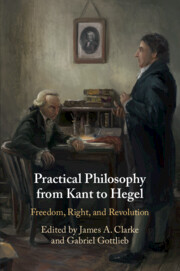Book contents
- Practical Philosophy from Kant to Hegel
- Practical Philosophy from Kant to Hegel
- Copyright page
- Contents
- Contributors
- Acknowledgments
- Abbreviations
- Introduction
- 1 The Original Empty Formalism Objection
- 2 Freedom and Ethical Necessity
- 3 Maimonides and Kant in the Ethical Thought of Salomon Maimon
- 4 Erhard on Right and Morality
- 5 Erhard on Revolutionary Action
- 6 Elise Reimarus on Freedom and Rebellion
- 7 Freedom and Duty
- 8 Fichte’s Ethical Holism
- 9 Jacobi on Revolution and Practical Nihilism
- 10 The Political Implications of Friedrich Schlegel’s Poetic, Republican Discourse
- 11 The Limits of State Action
- 12 Echoes of Revolution
- 13 Public Opinion and Ideology in Hegel’s Philosophy of Right
- Bibliography
- Index
2 - Freedom and Ethical Necessity
A Kantian Response to Ulrich (1788)
Published online by Cambridge University Press: 16 March 2021
- Practical Philosophy from Kant to Hegel
- Practical Philosophy from Kant to Hegel
- Copyright page
- Contents
- Contributors
- Acknowledgments
- Abbreviations
- Introduction
- 1 The Original Empty Formalism Objection
- 2 Freedom and Ethical Necessity
- 3 Maimonides and Kant in the Ethical Thought of Salomon Maimon
- 4 Erhard on Right and Morality
- 5 Erhard on Revolutionary Action
- 6 Elise Reimarus on Freedom and Rebellion
- 7 Freedom and Duty
- 8 Fichte’s Ethical Holism
- 9 Jacobi on Revolution and Practical Nihilism
- 10 The Political Implications of Friedrich Schlegel’s Poetic, Republican Discourse
- 11 The Limits of State Action
- 12 Echoes of Revolution
- 13 Public Opinion and Ideology in Hegel’s Philosophy of Right
- Bibliography
- Index
Summary
The paper examines a set of critical arguments presented by Johann August Heinrich Ulrich in his 1788 book Eleutheriology or On Freedom and Necessity against Kant’s conception of transcendental freedom and the categorical nature of moral imperatives. Ulrich’s arguments are worth examining for a number of reasons. Historically, his criticism of transcendental freedom is of interest partly for its novel interpretation of the principle of sufficient reason and partly for the use he makes of it in presenting an early version of the so-called problem of luck, which features centrally in the contemporary discussion of libertarian accounts of freedom. Structurally, Ulrich’s criticisms cleverly target the delicate balance Kant seeks to establish between transcendental freedom and the moral “ought” and help bring into view the relations between practical and theoretical claims in Kant’s defense of transcendental freedom. I argue that a Kantian response to Ulrich’s criticism of transcendental freedom is possible and that the basis for Ulrich’s rejection of Kantian categoricity – a naturalistic conception of ethical necessity – is flawed. By the same token, however, my argument shows the importance of Ulrich’s book when it comes to engaging with Kant’s philosophy.
Keywords
- Type
- Chapter
- Information
- Practical Philosophy from Kant to HegelFreedom, Right, and Revolution, pp. 28 - 44Publisher: Cambridge University PressPrint publication year: 2021
- 1
- Cited by

